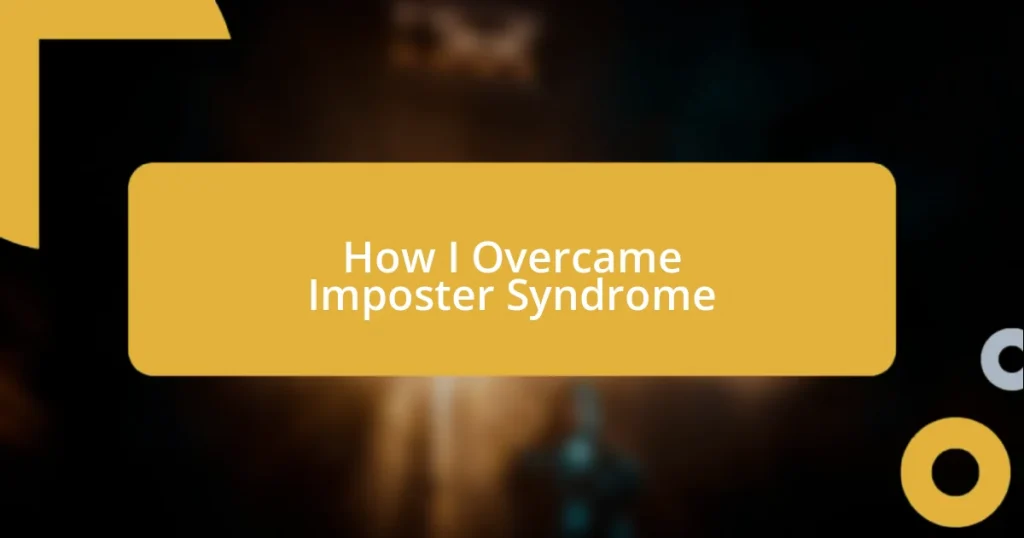Key takeaways:
- Recognizing and validating feelings of self-doubt is essential in overcoming imposter syndrome, allowing for more open discussions about self-worth.
- Setting small, achievable goals and seeking feedback from trusted peers fosters confidence and counters feelings of inadequacy.
- Practicing self-compassion and maintaining long-term strategies, such as journaling and goal setting, supports resilience against self-doubt over time.

Understanding Imposter Syndrome
Imposter syndrome is a psychological pattern where individuals doubt their accomplishments and fear being exposed as a fraud, despite evident success. I remember the first time I was called to lead a project. Instead of feeling excitement, I was overwhelmed by the nagging thought that someone would soon realize I didn’t belong in that role. Have you ever felt like a pretender in your own achievements?
It manifests in various forms, often leading us to discredit our skills and underplay our successes. For instance, during a recent presentation, I meticulously prepared, yet as I spoke, I couldn’t shake the feeling that my colleagues were questioning my expertise. It’s striking how this self-doubt can creep in during moments we should feel most confident, right?
What’s particularly interesting is that imposter syndrome isn’t limited to any specific demographic; it affects people from all walks of life. I often find comfort in discussing it with peers, and it’s both surprising and reassuring to learn that so many of us share these feelings. Isn’t it fascinating how acknowledging these shared experiences can lessen the weight they carry?

Recognizing My Feelings
Recognizing my feelings was a crucial first step in overcoming imposter syndrome. I recall sitting at my desk, heart racing, as I began to internalize the anxiety creeping into my daily thoughts. It dawned on me that these feelings weren’t just random; they were signals indicating the disconnect between my accomplishments and my self-perception.
- I would often feel a knot in my stomach before sharing ideas in meetings.
- Recognizing that familiar tightness became a cue for me to examine the root of my anxiety.
- Journaling my emotions revealed patterns that helped me understand my triggers.
- I’d notice that after receiving positive feedback, my instinct was to shrug it off and dismiss it as luck.
- Learning to validate my feelings instead of ignoring them made a difference in navigating my self-doubt.
Ultimately, acknowledging these feelings allowed me to confront them openly, leading to more productive conversations about my self-worth.

Identifying Triggers and Thoughts
Identifying the triggers and thoughts that fuel imposter syndrome is an essential part of the healing process. I vividly remember the sinking feeling I had during a performance review. As my supervisor praised my contributions, I couldn’t help but fixate on the idea that they were being overly generous, leading to an internal monologue filled with self-doubt. Have you ever found yourself questioning the validity of praise? It’s remarkable how our minds can warp positive validation into negative narratives.
Sometimes the things that trigger my imposter feelings are surprising. For example, attending networking events used to make my heart race and my palms sweaty. I’d catch myself overthinking every conversation, convinced that others would see right through me. When I began to jot down these instances, patterns emerged. I noticed that certain environments heightened my feelings of inadequacy, while others made me feel more secure. Identifying these settings helped me prepare mentally; understanding which thoughts were rooted in reality versus those fueled by fear was enlightening.
It’s also important to notice the types of thoughts that accompany these triggers. I found that words like “should” and “must” often surfaced when I felt triggered, amplifying the pressure I put on myself. For instance, new tasks would lead me to think, “I should know how to do this already.” Recognizing this mindset opened my eyes to the negative self-talk that accompanies good intentions. Now, when those thoughts pop into my head, I challenge them. This realization has paved the way for a kinder internal dialogue.
| Trigger | Thought |
|---|---|
| Acknowledgment in meetings | I don’t deserve this recognition. |
| Networking events | I’ll embarrass myself talking to others. |
| Feedback from colleagues | They’re just being nice; it’s not genuine. |

Building Confidence and Skills
Building confidence takes practice, and I found that setting small, achievable goals can be incredibly effective. For instance, I decided to contribute at least one idea in every meeting. Initially, my heart raced as I spoke up, but with each contribution, I felt a little more assured. Have you ever noticed how taking small steps can build momentum? With each successful participation, my self-belief began to soar.
As I gained confidence, I also invested time in enhancing my skills. I enrolled in workshops relevant to my field, pushing myself to learn new techniques and strategies. I vividly recall the thrill of completing a challenging project that I had previously doubted my ability to tackle. That moment of realization—when I saw my growth firsthand—was pivotal. Not only did it solidify my competence, but it also helped me see my worth in a more tangible way.
It’s interesting how sharing knowledge with others can reinforce your own steadiness. I started mentoring a junior colleague, and the act of guiding someone else illuminated my strengths. I used to wonder, do I really have valuable insights to share? Yet, as I helped her navigate challenges, I recognized my accumulated experience and expertise. This exchange not only boosted my confidence but also transformed my self-doubt into a feeling of empowerment.

Seeking Support and Feedback
Seeking feedback can be a game-changer in overcoming imposter syndrome. I remember a time when I hesitated to share my work for critique. The thought of opening myself up to judgment was terrifying. But when I finally did, the constructive feedback I received was not only validating but also incredibly enlightening. It taught me that others’ perspectives could reveal strengths I’d overlooked in myself. Have you ever considered how feedback could illuminate your blind spots?
I also found great support in sharing my feelings with trusted friends and colleagues. We often assume we’re alone in our struggles, but discussing my imposter thoughts created a powerful sense of camaraderie. For instance, I once confided in a coworker about my fear of being figured out as a fraud. Much to my surprise, she admitted she felt the same way, and we ended up supporting each other through our self-doubt. Isn’t it comforting to realize you’re not in this battle alone?
Lastly, learning to ask for help was a pivotal moment in my journey. I used to cringe at the idea of reaching out, fearing it might expose my weaknesses. However, when I began to seek mentorship, the relationships I formed were incredibly enriching. I recall a specific mentor who not only gave me valuable advice but also reassured me that everyone has moments of insecurity. His words felt like a warm hug, reminding me that it’s perfectly normal to seek support along the way. Have you found someone you can turn to for guidance? Embracing that support can truly transform your experience.

Practicing Self-Compassion
Practicing self-compassion has been a transformative practice for me in battling imposter syndrome. I vividly remember moments when I was overly critical of myself, feeling like I could never measure up. Shifting my inner dialogue to one that prioritized kindness and understanding changed everything. Have you ever spoken to yourself in a way that felt more like a friend than a critic? It’s remarkable how much clearer our minds can become with that simple shift.
One particular instance stands out. After finishing a challenging presentation, instead of the usual self-reproach, I chose to reflect on what I did well. I acknowledged my hard work and the effort I put into preparing, even though I stumbled on a few points. This new approach didn’t just lighten the burden of perfectionism but also nurtured a real sense of gratitude for my efforts. Isn’t it fascinating how focusing on our strengths can reshape our perception of success?
As I continued to practice self-compassion, I noticed it deeply impacted my resilience. When setbacks occurred, I learned to treat myself with the same understanding I’d offer to a friend facing a similar challenge. I remember one time I failed to secure a project I wanted so desperately. Instead of near-constant negative self-talk, I asked myself, “What can I learn from this experience?” That question opened up possibilities for growth rather than drowning in disappointment. Have you tried extending the same care to yourself? It’s a powerful way to cultivate a more positive mindset amidst the chaos of self-doubt.

Maintaining Long-Term Strategies
Maintaining long-term strategies to combat imposter syndrome has been crucial for me. One strategy I’ve found particularly effective is setting aside regular time for self-reflection. I try to carve out at least 15 minutes every week to journal about my achievements and the challenges I’ve faced. During one of these sessions, I discovered patterns in my thinking that tied back to my fears. It was eye-opening to analyze how my persistent doubts crept in, especially after major wins. Have you ever taken a moment to look back and see the larger picture of your journey?
Another way I’ve worked on this is through goal setting. Instead of overwhelming myself with lofty ambitions, I focus on smaller, attainable goals that serve as stepping stones. I recall setting a goal to learn a new skill related to my work. As I made progress, I felt a shift in my confidence, realizing that each small victory reinforced my competence. Have you identified manageable goals for yourself? Each success can be a reminder that you’re capable, helping to chip away at the imposter feelings.
Lastly, I’ve learned that staying connected with my support network is key. Regular check-ins with friends and colleagues remind me that validation doesn’t solely come from achievements. I’ll never forget a heartfelt conversation I had with a mentor during a tough period. We discussed our respective journeys, and as she shared her own struggles, it inspired me to embrace my vulnerability. How often do you reach out to your network to share experiences? Those connections can be a lifeline, providing encouragement when self-doubt threatens to overpower us.















